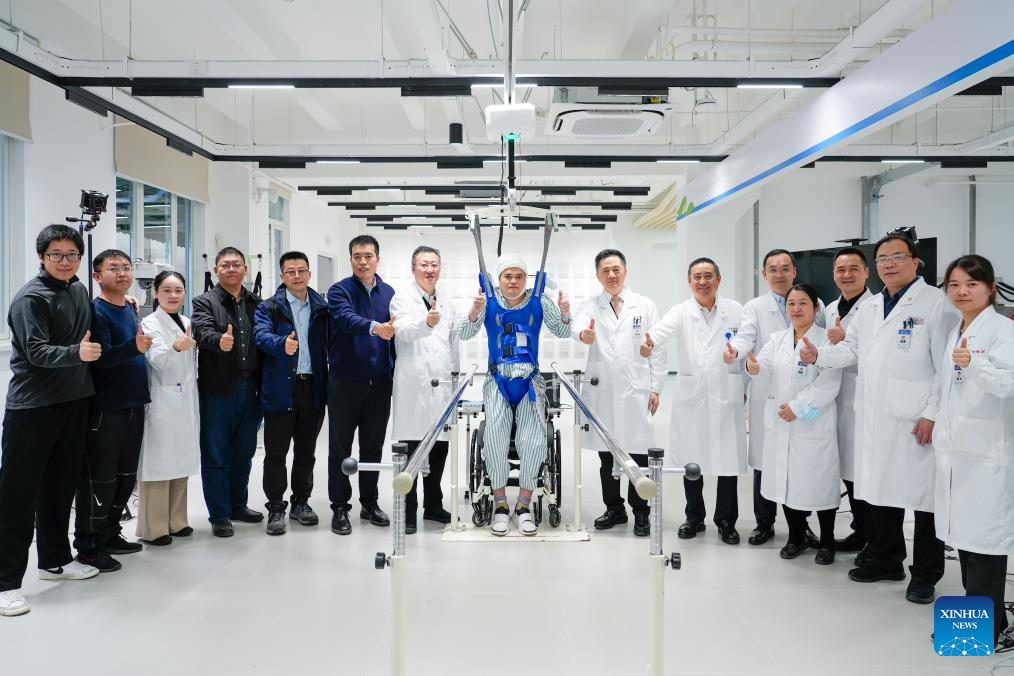Source: Xinhua, Editor: huaxia, March 19, 2025

A patient who has received a surgery featuring an innovative “brain-spinal interface” technology poses for a group photo with the research team from Fudan University and the clinical team from Fudan-affiliated Zhongshan Hospital in Shanghai, east China, on Jan. 22, 2025. (Fudan University/Handout via Xinhua)
SHANGHAI, March 19 (Xinhua) — For many, walking is a simple and everyday act, yet for those living with spinal cord injuries, it remains a distant and often unattainable dream.
However, four patients in China have taken life-changing steps toward reclaiming this ability after they received surgery featuring an innovative “brain-spinal interface” technology in Shanghai.
The breakthrough hinges on a “triple-integrated” brain-spinal interface system created by Jia Fumin’s team at Fudan University’s Institute of Science and Technology for Brain-Inspired Intelligence.
Their brain-spinal interface system works by capturing motor signals from the brain’s movement center, decoding them via advanced algorithms, and delivering tailored electrical pulses to spinal nerves below the injury site, thus effectively rerouting movement commands around injured areas.
Unlike external assistive devices, this system creates an internal “neural bypass,” allowing patients to control their limbs naturally.
For patients like Lin, a man in his 30s who found himself reliant on a wheelchair following a life-altering fall two years ago, the results have been nothing short of transformative.
Lin’s journey began in October 2024 when he volunteered for a clinical trial after spotting a recruitment notice on Fudan’s official social media page. His surgery, performed on Jan. 8 at Fudan-affiliated Zhongshan Hospital, involved minimally invasive implants: two 1-mm-diameter electrodes placed in his brain’s motor cortex and a stimulator chip in spine.
The progress was startlingly swift. By day three, he could move both legs using brain signals. Within two weeks, he could lift his right leg high enough to step over moving obstacles. By day 15, he managed to walk more than five meters using a standing frame with suspension support.
“I used to cry every day,” Lin shared. “Now, I can walk again. I am grateful for the efforts of every member of the research team.”
Similar breakthroughs took place for two other patients who regained leg movement within hours of their surgeries in February. Notably, both exhibited voluntary leg lifts just one day after their operations.
While a 2023 Swiss study published in Nature demonstrated similar principles, Fudan’s approach exhibits distinct advantages. The Swiss method required invasive dual craniotomies (leaving palm-sized openings) and staged surgeries over two years, raising the risk of infections.
In contrast, Jia’s team can complete both brain and spinal procedures in a single four-hour session using ultra-minimally invasive techniques. They integrate multiple components into a miniature brain device, enhancing signal stability while reducing surgical trauma.
Even more promising are signs of neural regeneration. While the Swiss team observed nerve repair after six months, Lin showed early signs within two weeks.
“It’s as if dormant nerves ‘woke up’ once the brain-spinal connection was restored,” explained Dr. Ding Jing, director of the neurology department at Zhongshan Hospital.
Follow-up exams revealed further improvements: Lin’s sensation gradually returned in his legs, along with muscle contractions and renewed control over bodily functions.
The new technology might help more people reignite the hope for life, as China now has 3.74 million spinal injury patients, with 90,000 new cases annually.
Despite its prospects, scaling the technology faces hurdles, including scarce implantable electrodes and the complexity of decoding diverse motor signals. “Achieving real-time, precise decoding remains our biggest challenge,” Jia noted.
Additionally, the system is currently limited to adults capable of intensive post-op rehabilitation, requiring 5 to 7 hours of therapy each day.
Collaborating with hospitals like Zhongshan and Huashan, Jia’s team aims to refine algorithms, gather more clinical data, and prepare for regulatory trials. They will also develop wearable neuroregulation devices for milder cases and multi-modal motion monitoring systems in the future.
